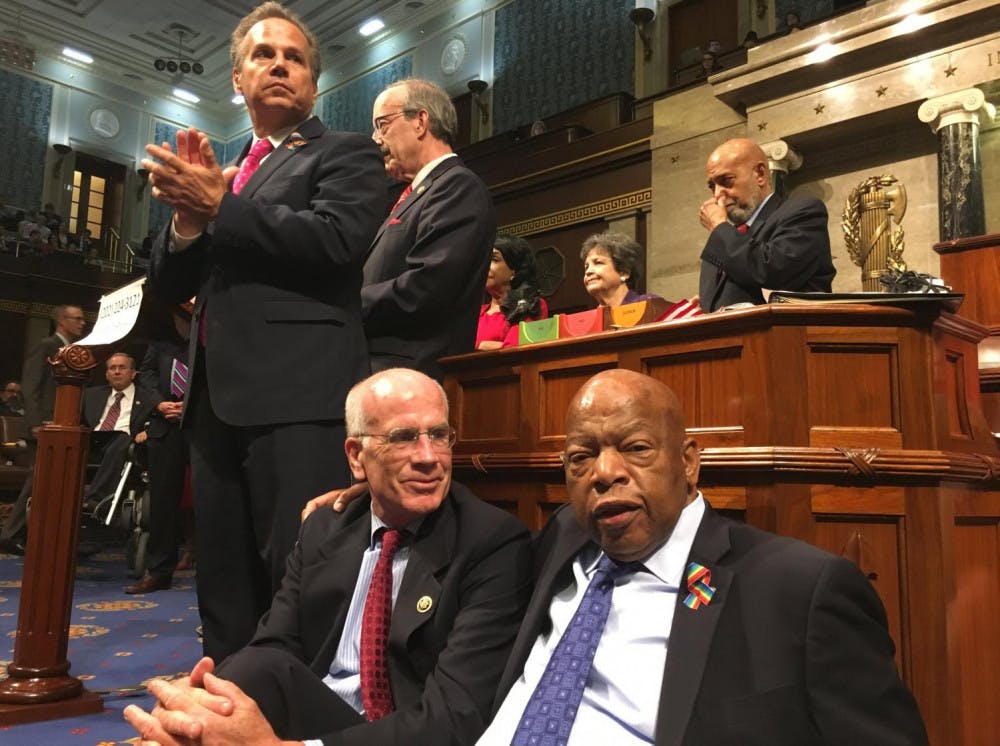Congressman Welch has represented Vermont in the House of Representatives as the state’s sole delegate since he was elected in 2006. After launching his career in politics during the civil rights era, Welch’s career has focused on energy efficiency, housing discrimination and bringing broadband to rural Americans. Looking toward a likely win in his re-election bid this year, The Campus sat down with the congressman to reflect on over a decade of work in the House.
Reflecting on over a decade in Congress, what do you consider to be your biggest accomplishment and why?
On climate change and economic recovery…
I think the biggest accomplishments that we had were clearly during the Obama years: it was the passage of the Affordable Care Act. I served on the Energy and Commerce Committee and I was very, very active in that effort. The biggest accomplishment in the House — but didn’t pass in the Senate — was the Waxman-Markey climate change bill, which we passed in that same session of Congress. That would have reduced emissions by 80% by 2050, and all of us are so disappointed that we lost that by one vote in the Senate. The last economic crisis, of course, was during the Obama Administration, when Wall Street collapsed and brought down Main Street. I played an active role in the American Recovery Act, which started to get us back on our feet.
I’ve been a leader on climate change issues. My role in the [Waxman-Markey bill] was to be the principal advocate for the energy efficiency aspects of that bill. Since then, I’ve been a champion in Congress on climate change, particularly the benefits of energy efficiency. I got involved in that when I was in the Vermont senate, and one of the things that I look back on with fond memories is the climate march that was organized by Bill McKibben when he was starting 350.org. He and Middlebury students led a march from Montpelier to Burlington in the election, back in 2006. I was one of the speakers at that original march.
How do you think we can build trust in politics again? Do you think politics have always been this divisive?
On Trump and social media...
[Politics] hasn’t been this divisive. Trump has embraced division as a tactic. One of his first acts as president was to ban people coming into this country on the basis of religion. That’s shocking. One of his policies was to separate children from families at the southern border — and I was one of the first members of Congress to go down there and witness that firsthand. I went to the Texas-Mexico border. And even today, we’ve learned that there are over 500 children where the government has no idea where their parents are. Trump plays racial politics to a degree that no one has ever seen. He won this election with three million fewer votes than Hillary Clinton, and he’s done everything that he can to intensify division rather than create unity since then.
There’s another issue here that will take significant thought and effort to overcome it, and that’s social media. What we see with the explosion of social media is an explosion of misinformation, of hate, of conspiracy theories — and it’s created a toxic, polluted atmosphere for dialogue about the problems that we collectively face. I think that’s a big challenge for our democracy. When there's no norms and no mutual respect, then it makes it much more difficult to find common ground.
That’s a big problem, and Trump is a master at understanding how this works and he exploited it and he was very successful at mowing down all of his Republican opponents in those primaries. This is a real challenge to our democracy.
On finding common ground with Republicans…
There’s two ways [to deal with partisanship] — personal and political. The personal way of dealing with it is that you show respect. You listen more than you talk. You look for where there’s common ground.
So, for example, I am a leader of the rural broadband caucus. I find ways of interacting where it’s about us trying to solve the challenges of the people who we represent. I have a colleague from West Virginia, [Rep.] David McKinley. He’s a Republican, and he is a good partner of mine when working on energy efficiency. On the other hand, he’s from coal country, and he attacks the Environmental Protection Agency (EPA), which is causing a loss of coal jobs. I don’t agree with him on [attacking the EPA], but we agree on energy efficiency.
As a way of trying to build a relationship with him and show respect for the coal miners, I went to stay with him in his house in Harrison County, West Virginia, and we spent a day in a coal mine — we went down 900 feet and 4.5 miles in. We spent an afternoon being with coal workers who were working on a coal seam.
The point I was making was that I’m against coal [in that] I’m for clean energy, but I’m for the coal miners. Those coal miners did not create climate change. In fact, those coal miners are losing jobs, and they’re hard workers. I compared the coal miners to our dairy farmers as the hardest working people I’ve ever met. I saw how much that gave me an opportunity to be heard, by David and by many others who began to see that I’m advocating for clean energy, but it’s not because I’m against those coal miners. I’m against a lot of the coal company owners, but the miners are good people. That’s a way of showing personal respect and creating trust.
Institutionally is where Trump is pretty toxic. He is attacking institutions instead of building them up, instead of reforming them and strengthening them. When I say institutions, I mean everything from the court systems to the intelligence community to the EPA, where we have lost one-thousand scientists who have left in despair because of political manipulation. We have to build up our institutions and have trust in institutions to build trust in goals that are important to our society. So, on a personal level, it’s how you interact with people. On a political level, it’s a commitment to reforming, not destroying, institutions that we all need.
Do you have any fun stories from working in Congress for over a decade? What are some of your best days working in Congress?
On cheese (and getting the job done)...
One of my best days was when Mateo Kehler, who was the head of Jasper Hill Cheese, showed up at my office in D.C. in a t-shirt and cargo shorts. He was in a rage-slash-panic, because the Federal Drug Administration (FDA) just issued a rule that said cheesemakers could no longer store their cheese on wooden boards. Pretty crazy, because we have been storing cheese on wooden boards since the last supper. The background is that they did an inspection of a cheesemaking facility in upstate New York and found contaminated cheese, and there were woodboards there. As it turns out, the whole place was contaminated; it’s not that the boards were contaminated. [The cheesemaking facility in upstate New York] really had back practices and needed to be closed down, and they were. But the bad practices were the problem, not the use of wood.
So in any event, this would have been catastrophic for this award-winning cheese company, Jasper Hill. What do we do? So this was a while ago, when Paul Ryan was the chair of the Budget Committee. He’s Republican, and he and I don’t agree on anything. He represents Wisconsin, where they make a lot of cheese, and he and I used to kid a lot about who had better cheese. So, I went on the floor and found him, and I said ‘Paul, we got us a cheese problem.’ I explained it to him, and within a day, we called up the FDA to explain our problem. We said, ‘we’ve got a cheese problem, and you’re soon going to have a budget problem.’ And it got fixed.
It’s an only-in-Vermont story because you literally have this citizen, who is running this wonderful enterprise called Jasper Hill Cheese, show up unannounced in his t-shirt and cargo shorts to tell me what the problem was. It’s existential. And in a few days, it was solved. And it was solved in a significant part because I had a good pre-existing relationship with Paul Ryan, and I knew that, when it came to cheese and how it would affect Wisconsin cheese makers, Paul and I would be on the same page. It was an interesting combination of a Vermonter coming and dropping in and feeling completely comfortable in the office and asking for something that couldn’t be done, and we did it all in a couple of days.
On race and Representative John Lewis…
Another wonderful story: I got my start in politics in the civil rights movement. When I was in college, I dropped out of college to go to Chicago to work for a community organization that was fighting discriminatory housing. I dropped out of college for what would have been my junior year. I worked there, and then I returned to college, and then I returned to Chicago as a Robert Kennedy Fellow to resume my work when I got out [of college].
During what would’ve been my junior year in college, I went down to Atlanta to the Ebenezer Baptist Church where Martin Luther King, at that time, was the pastor. And I was in the church, and he spoke. It was a powerful experience to be with him when he spoke in that church. And afterwards, I went upstairs when he had a press conference, and there were very few people there, and he was denouncing the Vietnam War. My whole beginnings in politics were inspired by the racial justice movements of the late 60s — the voting rights movement.
Fast forward, I’m in Congress and I had a colleague that I revered from afar for a long time, and that was [Rep.] John Lewis. We, in the House, were very frustrated that Speaker Paul Ryan would not take up any gun safety legislation. We protested on the floor, and I spent a good deal of time sitting on the floor next to John Lewis when we were protesting in Congress about gun violence. All of us who served with John regarded it as a special privilege to be with him and to be his colleague. That memory, of sitting on the floor of the House, next to John, is probably one of my favorite, most proud moments. His advocacy was [to] get in good trouble… cause good trouble.
Now we’re continuing with the effort to deal with the incredible racism in our county that is systemic and ingrained. With the leadership of the Black Congressional Caucus, we passed the George Floyd Justice in Policing Act, which, unfortunately, Senator [Mitch] McConnell won’t pass in the senate. That continuation of the opportunity to work on racial justice issues means a lot to me, and I really appreciate the work that the students at Middlebury are doing to bring attention to systemic racism and try to find practical ways to address it.

Lucy Townend '22 is a Managing Editor alongside Abigail Chang.
She previously served as a senior section editor, a local editor, and a copy editor.
Townend is majoring in International Politics and Economics, studying French throughout her years at Middlebury and is planning on completing a thesis focused on income inequality and regime change.
This previous summer, Townend interned as a private banking analyst at a mid-sized bank in Chicago and plans to continue her work there after graduation.




